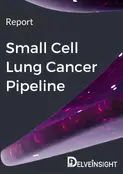Small Cell Lung Cancer remains among oncology's most formidable adversaries, characterized by extraordinary aggressiveness and limited long-term treatment success. Although patients demonstrate initial favorable responses to standard chemotherapy and radiation regimens, therapeutic failure occurs almost inevitably, producing survival outcomes significantly inferior to other lung malignancy types. This challenging clinical reality has catalyzed extensive research investments, establishing a comprehensive SCLC pipeline focused on transformative treatment breakthroughs.
Modern scientific endeavors center on deciphering the complex biological processes underlying SCLC pathogenesis and therapeutic resistance. Unlike conventional lung cancers harboring targetable oncogenic mutations, SCLC typically lacks these characteristic genetic features, historically limiting precision medicine applications. However, advanced genomic profiling methodologies have revealed nuanced molecular alterations offering potential therapeutic intervention opportunities. Researchers now utilize sophisticated knowledge of gene regulatory circuits, chromatin modification systems, and cellular signaling networks to identify unique SCLC vulnerability points.
Innovative approaches target essential transcription factors responsible for maintaining SCLC malignant characteristics. These regulatory proteins orchestrate comprehensive genetic programs controlling cancer cell proliferation, survival pathways, and metastatic potential. Through strategic disruption of these molecular control hubs, scientists anticipate achieving sustained therapeutic responses, potentially reprogramming malignant cells toward less aggressive phenotypes or enhancing their susceptibility to conventional SCLC Treatments.
Epigenetic therapeutic approaches have emerged as exceptionally promising avenues within SCLC research frameworks. These interventions modify chromatin architecture and transcriptional regulation, offering potential to reverse pathological gene suppression while reactivating tumor suppressor mechanisms. Development has advanced from broad-spectrum inhibitors to precision compounds targeting specific epigenetic complexes involved in SCLC biology. Laboratory studies demonstrate these agents' ability to inhibit tumor development while synergizing with traditional chemotherapeutic protocols.
Metabolic vulnerability exploitation constitutes another rapidly expanding research domain addressing SCLC's distinctive cellular energy demands. Fast-dividing cancer cells face considerable metabolic stress due to their extraordinary proliferation rates and heightened energy consumption patterns. Investigators systematically map metabolic pathways that SCLC cells depend upon more heavily than healthy tissues. Through targeted disruption using novel inhibitory compounds or metabolic interventions, researchers seek to selectively compromise tumor viability while protecting normal cellular integrity.
Immunological intervention strategies have gained substantial traction despite SCLC's traditionally immunosuppressive tumor microenvironment. Recent advances have identified effective approaches for stimulating immune system engagement against SCLC malignancies. Contemporary methodologies include checkpoint inhibition, combination therapies improving antigen presentation capabilities, and microenvironment-modulating agents. Emerging vaccination strategies and targeted immune-activating molecule delivery systems further broaden immunotherapeutic possibilities.
DNA damage response pathway targeting has captured considerable scientific attention given SCLC's intrinsic genomic instability features. This inherent DNA repair vulnerability indicates that further compromising cellular maintenance systems could drive malignant cells toward catastrophic damage accumulation. Scientists investigate DDR inhibitors combined with standard treatments to exceed repair capacity limits, creating potent synergistic effects for enhanced disease control.
Sophisticated drug delivery innovations parallel therapeutic development efforts, emphasizing optimal compound distribution to tumor sites. Advanced nanoparticle platforms, antibody-drug conjugate systems, and respiratory administration methods enhance therapeutic concentrations while reducing systemic toxicity and overcoming transport barriers. These delivery refinements maximize treatment effectiveness while improving patient tolerance profiles.
Biomarker discovery initiatives support precision treatment selection and response monitoring strategies. These range from protein expression signatures to circulating indicators enabling longitudinal disease assessment. Such tools prove invaluable for detecting treatment resistance early, identifying patients most likely to benefit from specific therapies, and monitoring minimal residual disease.
Clinical development programs bridge laboratory breakthroughs with patient care through systematic SCLC Clinical Trials. Promising experimental agents undergo thorough evaluation for safety characteristics, patient tolerability, and initial efficacy indicators. Modern adaptive trial designs facilitate early study modifications based on interim results, streamlining decision-making and accelerating successful candidate progression.
Collaborative networks involving research institutions, SCLC Companies, and advocacy organizations accelerate therapeutic development. Academic laboratories generate fundamental insights inspiring innovative treatment concepts, while biotechnology firms transform discoveries into viable candidates through complex development pathways.
The contemporary SCLC emerging drug development arena encompasses multifaceted strategies including epigenetic modulation, metabolic targeting, and immune system activation. Despite ongoing challenges, integrated research efforts and technological innovations provide genuine optimism for dramatically transforming patient outcomes.
Latest Reports Offered by Delveinsight:
Cart-related Neurotoxicity Market | Eosinophilia Market | Interbody Cages Market | Mammography Devices Market | Moderate Psoriasis Market | Pelvic Organ Prolapse Market | Phenylketonuria Market | Skin Burns Market | Transfusion-dependent Thalassaemia Market | Cancer Vaccines Market | Cardiac Monitoring System Market | Celiac Disease Market | Desmoplastic Small Round Cell Tumors Dsrcts Market | Esophageal Cancer Market | Fetal And Neonatal Monitoring Devices Market Market | Gender Dysphoria Market | Her3 Market | Hernia Repair Devices Market | Neurofibroma Market | Non Alcoholic Fatty Liver Disease Nafld Market | Nosocomial Infections Market | Oxygen & Hyperbaric Oxygen Equipment Market | Parkinson’s Disease Market | Phototherapies For Psoriasis Market | Spinal Cord Stimulators Market | Tbi Market | Vascular Graft Devices Market | Vulvar Cancer Market
Latest Reports:
https://www.delveinsight.com/sample-request/bowel-management-systems-market
https://www.delveinsight.com/sample-request/wilson-disease-pipeline-insight
https://www.delveinsight.com/sample-request/fiberscopes-market
https://www.delveinsight.com/sample-request/implantable-cardiac-monitors-market
https://www.delveinsight.com/sample-request/vidaza-api-insights
https://www.delveinsight.com/sample-request/diabetic-retinopathy-epidemiology-forecast
https://www.delveinsight.com/sample-request/mucopolysaccharidosis-iii-pipeline-insight
https://www.delveinsight.com/sample-request/orthopedic-trauma-devices-market
https://www.delveinsight.com/sample-request/invasive-candidiasis-market
https://www.delveinsight.com/sample-request/calciphylaxis-market
About DelveInsight
DelveInsight is a trusted provider of life sciences and pharmaceutical market research and consulting, offering actionable insights that empower organizations to make informed decisions. With a commitment to delivering strategic intelligence, DelveInsight serves as a key partner to global pharmaceutical, biotechnology, and healthcare companies looking to excel in an evolving market landscape.
Contact Us
Kanishk
Email: kkumar@delveinsight.com

